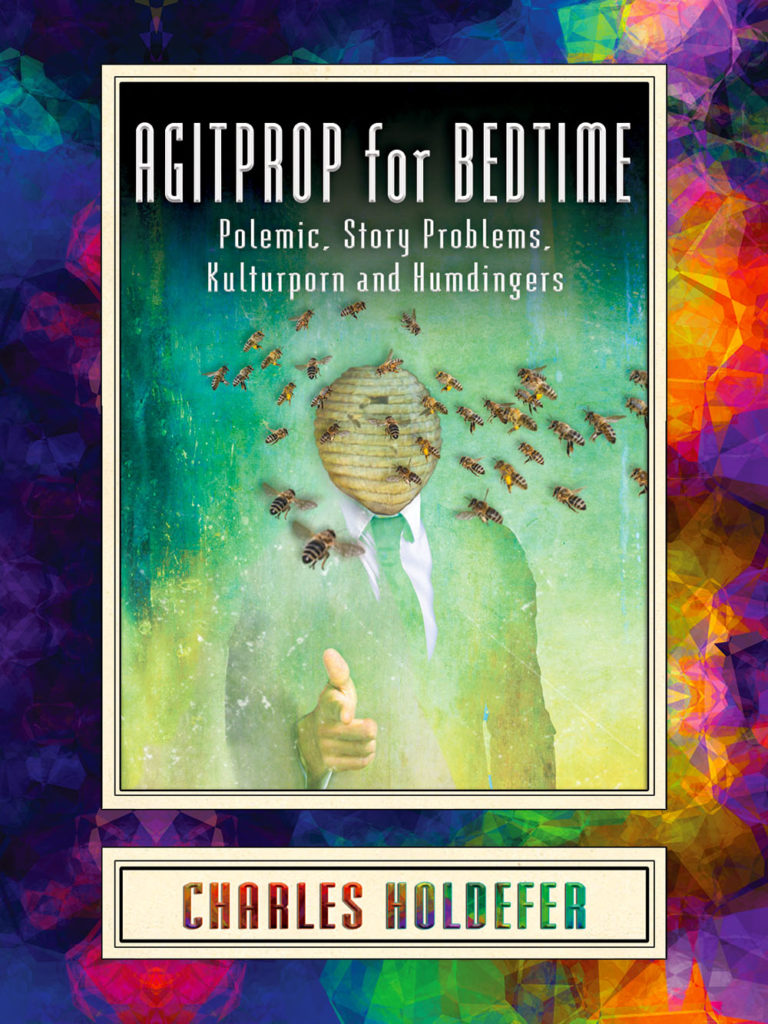
Today, we’re pleased to present an excerpt from Charles Holdefer’s Agitprop for Bedtime: Polemic, Story Problems, Kulturporn and Humdingers. Publisher Sagging Meniscus Press describes it as a “portable collection of polemical bedtime stories for adults.” And David Leo Rice hailed it as “Funny, creepy, and disorienting in all the best ways.” What follows is a particularly unsettling case study…
***
THE STRANGE CASE
OF PATIENT C
Patient C insisted that she should have “access” (sic) to health care. She used this term repeatedly, and it emerged as the primary symptom of her condition.
A generous grant from Freedom Street® allowed us to conduct several interviews with the subject. We hoped to find a diagnosis and a therapeutic option to help Patient C on her healing journey.
As a first step, she was referred to a lexicologist.
Report 1.1
confidential
Repeated attempts were made to persuade Patient C that “access” in the sense she assumed did not exist for everyone. She appeared to be suffering from a definition deficit. Side effects included perplexity and incomprehension.
Despite our efforts, Patient C did not relent. Her condition aggravated to the extent that she argued for a “right” and asserted it was “universal.” Her preoccupation with “access” had reached an advanced stage.
After a prolonged interview, it became obvious that Patient C was not responding to clarification. Her symptom was too deeply rooted.
She was referred to an etymologist.
Report 1.2
confidential
With a gentle preparation of the background, Patient C was informed that a “right” was a pre-existing condition. Moreover, a “right” was a proposition unavailable to scientific consensus and, even more troubling, the concept of “rights” was a common argument among market denialists.
Every effort was made not to accuse or morally judge the patient, but professional standards required that Patient C be informed of the problematic foundations of her assumptions.
Unfortunately, Patient C did not respond well to edifying treatment. She became visibly agitated. While still clinging to words like “access” and “universal,” she began to emphasize other terms, too, such as “mercenary” and “asshole.” She also displayed symptoms of shortness of breath and compromised aggressive impulse control, which brought an end to the consultation, as Patient C was escorted from the room with the help of several medical orderlies.
**************************************************************
At this point, the record becomes less clear, given the lack of authorized professional observers, but it appears that Patient C did not leave the hospital but lingered in a waiting area, either by accident or provocation. Witnesses claim that she continued to insist on “access.” According to the receptionist on duty, many people in the waiting area cried out similar statements, often in a state of heightened emotion.
Was Patient C’s condition contagious? At present, this hypothesis remains uncorroborated. But anecdotal accounts do suggest that Patient C and numerous others resorted to the same words.
In an effort to defuse an alarming situation while probing more deeply into her incomprehension (e.g., was Patient C suffering from a failure of phonemes that had impeded her morphemes? had she lost control of her vowels?), the subject was offered an emergency consultation with a phonologist.
Report 2.1
Confidential
Initial observations were encouraging. In fact, Patient C seemed articulate and in command of her thoughts and speech. She was consistently understandable. Nonetheless, her primary symptom persisted: she showed no sign of abandoning her claim to “access.”
Thus it would seem that the patient’s clarity and rationality are asymptomatic.
Vital signs such as pulse and respiration were variable, depending on her interlocutor’s degree of refusal.
Most worrying, however, were the following vitals: 1) the credit clearance of her Visa card was unsatisfactory; 2) her employment and insurance situation offered no plausible palliative. These findings were verified twice by the billing department.
Preliminary conclusion
Confidential
The case of Patient C remains inexplicable. At the time of this writing, she is languishing in a tautology ward. The prognosis is not good.
Follow Vol. 1 Brooklyn on Twitter, Facebook, and sign up for our mailing list.
